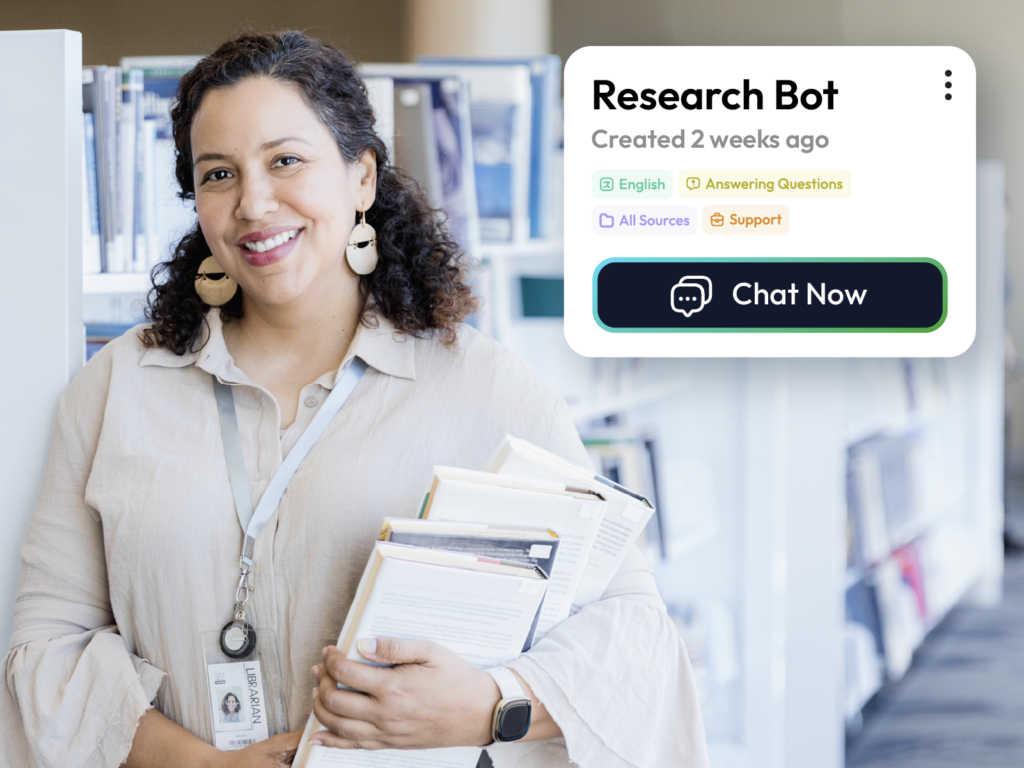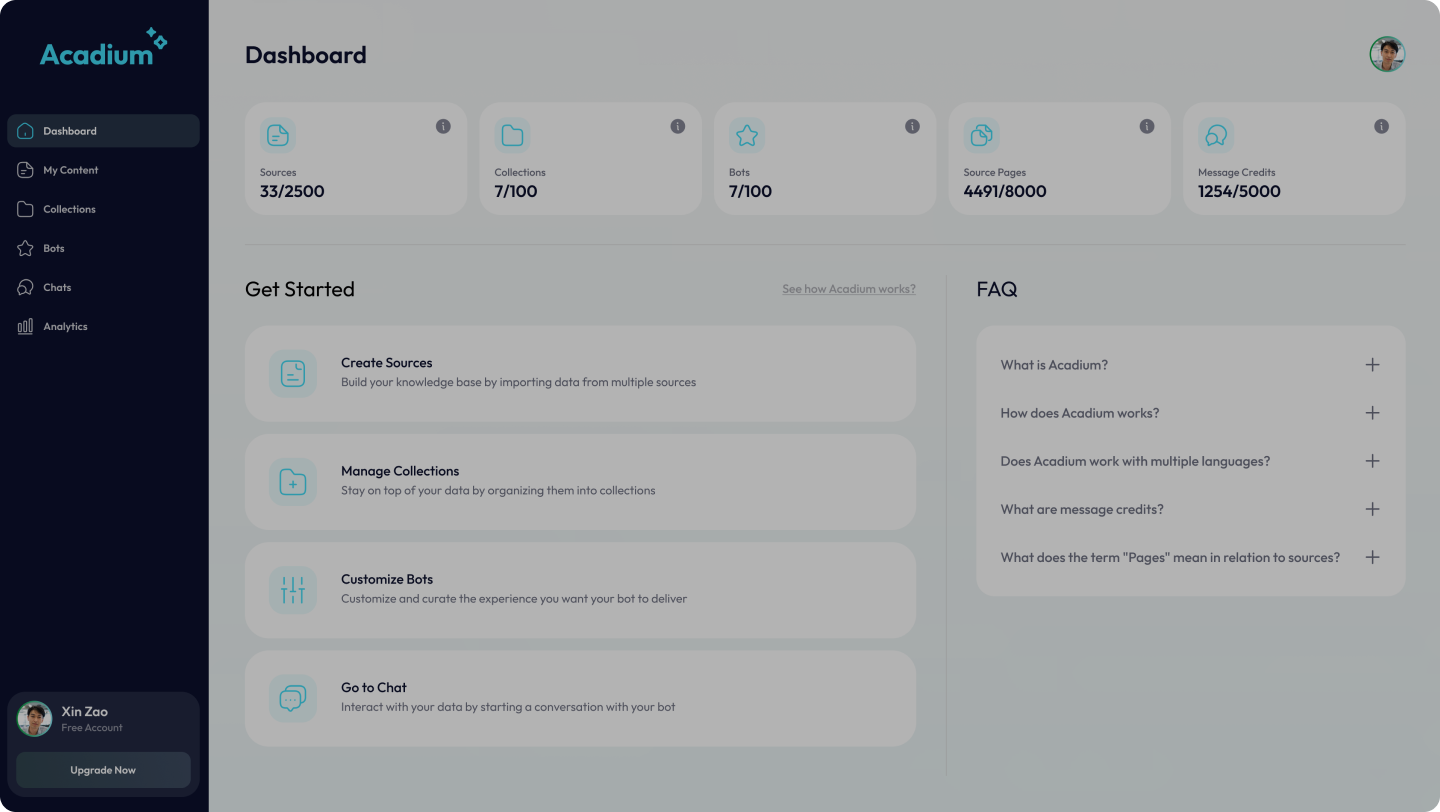Libraries at colleges and universities face mounting pressure to provide more personalized, accessible research support while often dealing with limited staff resources. Graduate students, in particular, require specialized assistance navigating complex research processes and locating specific resources within vast library collections. This is where AIe tools like Acadium can revolutionize library services by creating a virtual research concierge that provides immediate, personalized guidance to graduate researchers.
The Research Challenge for Graduate Students
Graduate-level research demands deep dives into specialized literature, datasets, and archival materials. Students often struggle with:
- Identifying the most relevant resources within extensive library collections
- Accessing specialized databases appropriate for their discipline
- Finding specific primary sources or rare materials
While librarians possess invaluable expertise to address these challenges, they cannot be available 24/7 to every student who needs assistance. This is the gap that a virtual research concierge built with Acadium can fill.
What is Acadium?
Acadium is an AI-powered platform designed specifically for higher education that can transform research processes, streamline administrative tasks, and create personalized learning experiences. For university libraries, Acadium offers a powerful solution to create custom knowledge bases from existing library resources and make them interactively accessible to students.
Building Your Library’s Virtual Research Concierge

Here’s how a university librarian could implement an Acadium-powered virtual research concierge:
1. Import Your Library’s Resources
The first step is gathering and uploading the content that will power your virtual concierge. A university librarian could import:
- Library guides and research handbooks
- Database access instructions and tutorials
- Collection catalogs and finding aids
- Subject-specific research methodologies
- Citation guides and academic writing resources
- Information about special collections and archives
- FAQs and common research challenges
Acadium accepts various formats including PDFs, Word documents, URLs, and even YouTube tutorials—perfect for incorporating all the instructional content your library has developed over the years.
2. Create a Specialized Collection
Once your resources are uploaded, organize them into collections based on research domains, departments, or resource types. For example, you might create separate collections for:
- Science and Engineering Research Resources
- Humanities Primary Source Collections
- Social Sciences Data Repositories
This organization allows you to create targeted virtual concierges that draw from the most relevant information for specific research needs.
3. Customize Your Acadium Search Bot
Now comes the exciting part—creating your virtual research concierge. Acadium allows you to build a custom AI bot that pulls information from your curated collections. You can customize the bot’s tone to match your library’s communication style, whether that’s formal and scholarly or friendly and approachable.
For graduate research support, you might design your concierge to:
- Answer questions about where to find specific resources
- Recommend databases based on research topics
- Provide guidance on accessing special collections
4. Deploy Your Virtual Research Concierge
Once configured, your Acadium research concierge becomes available to assist graduate students whenever they need help. Students can interact with the bot through:
- Your library website
- Department portals
- Library kiosks
Real-World Applications for Graduate Researchers
Let’s explore some scenarios showing how graduate students might use your Acadium-powered research concierge:
Scenario 1: Locating Specialized Resources
A doctoral student in neuroscience asks: “Where can I find historical brain imaging datasets from the 1990s?” The Acadium bot can instantly direct them to specific databases, special collections, or archived research data within your library’s holdings.
Scenario 2: Navigating Complex Collections
A history graduate student inquires: “Does the library have primary sources related to 19th-century immigrant communities in this region?” The virtual concierge can provide information about relevant archival collections, finding aids, and even the specific procedures for accessing these materials.
Scenario 3: Interdisciplinary Research Support
A student working across disciplines might ask: “I’m researching climate change impacts on urban planning. Which collections should I be consulting?” The concierge can recommend resources from multiple departments and suggest interdisciplinary databases.
Benefits of Implementing an Acadium Research Concierge
Based on the data provided about Acadium, libraries implementing this solution could expect significant benefits:
For Librarians:
- Reduce time spent answering repetitive questions, allowing focus on complex research consultations
- Extend research support beyond library hours
- Gather valuable data on student research needs through question analysis
For The Institution:
- Enhance research output and quality
- Differentiate the institution’s research support services
- Maximize the return on investment in library resources
Conclusion
The Acadium virtual research concierge represents a powerful evolution in how academic libraries can support graduate-level research. By combining the comprehensive knowledge of librarians with the accessibility and scalability of AI, libraries can create a service that helps graduate students navigate complex research landscapes more effectively. Contact us today to learn more.











